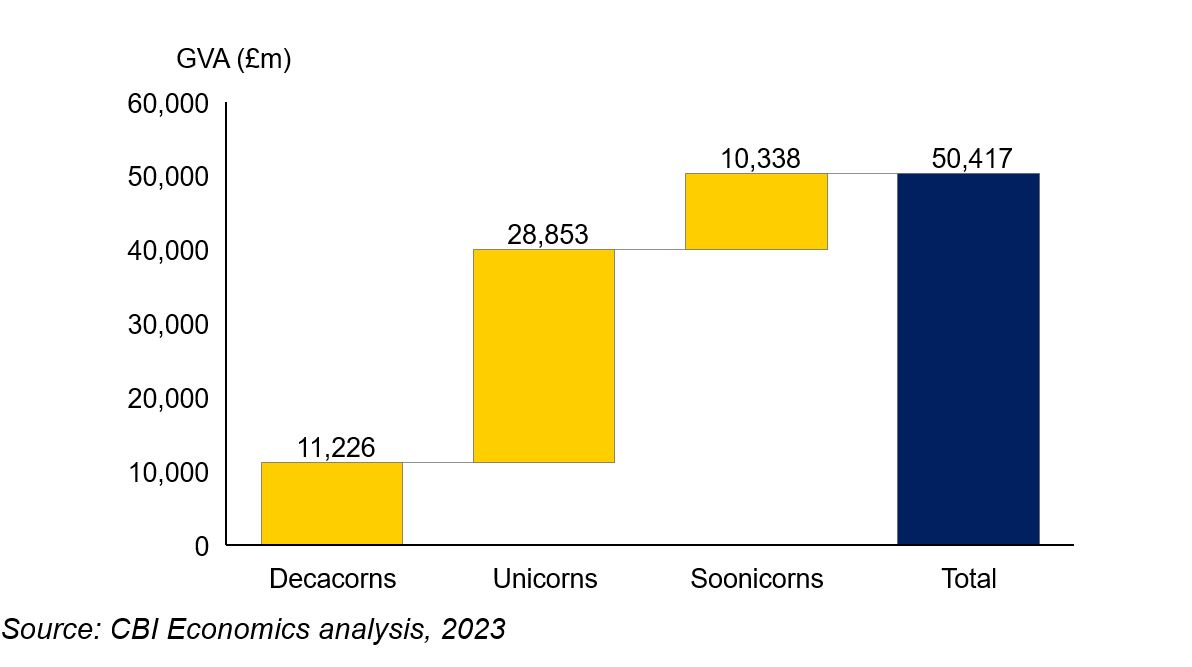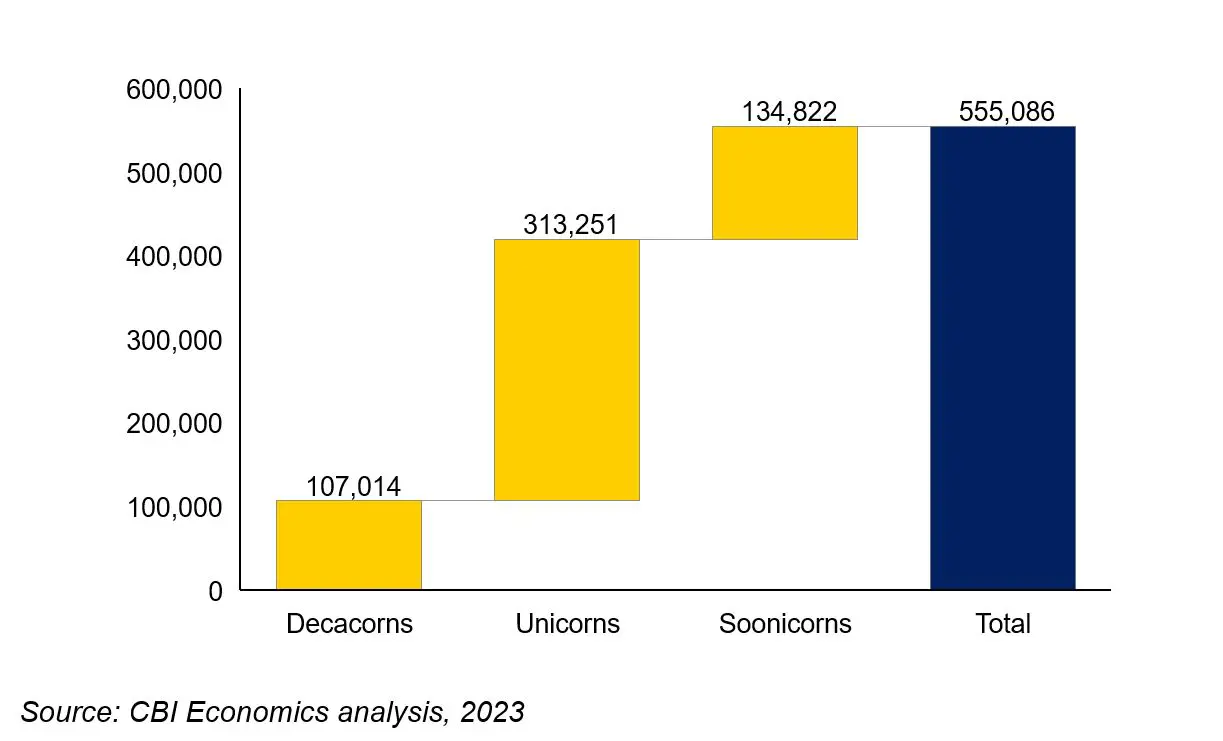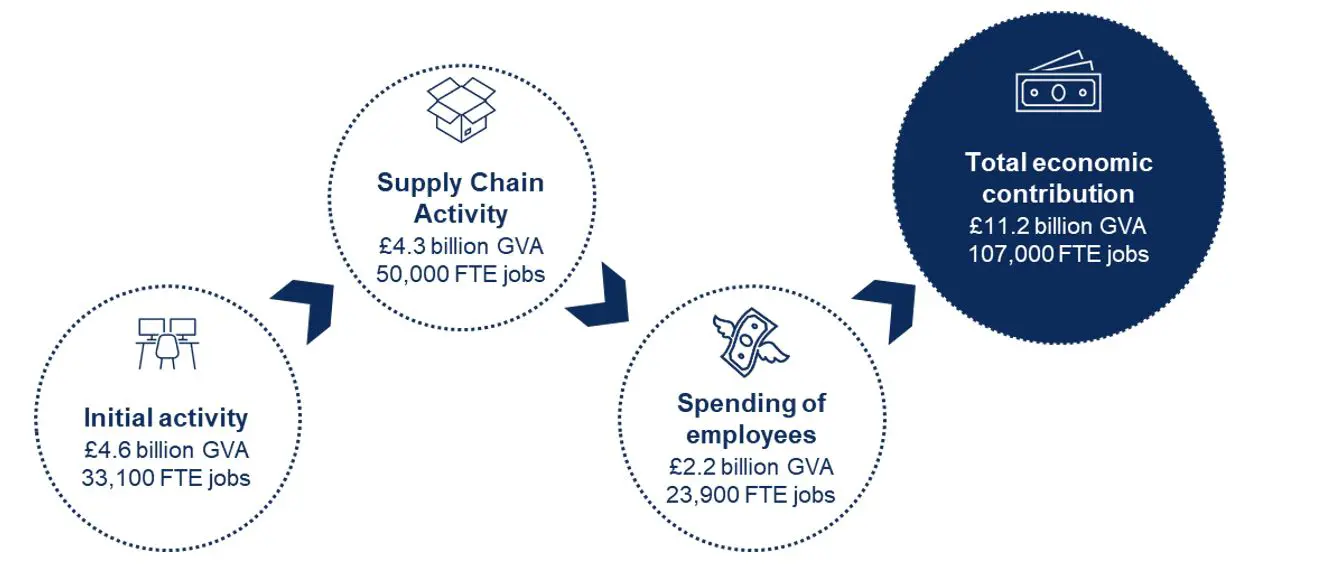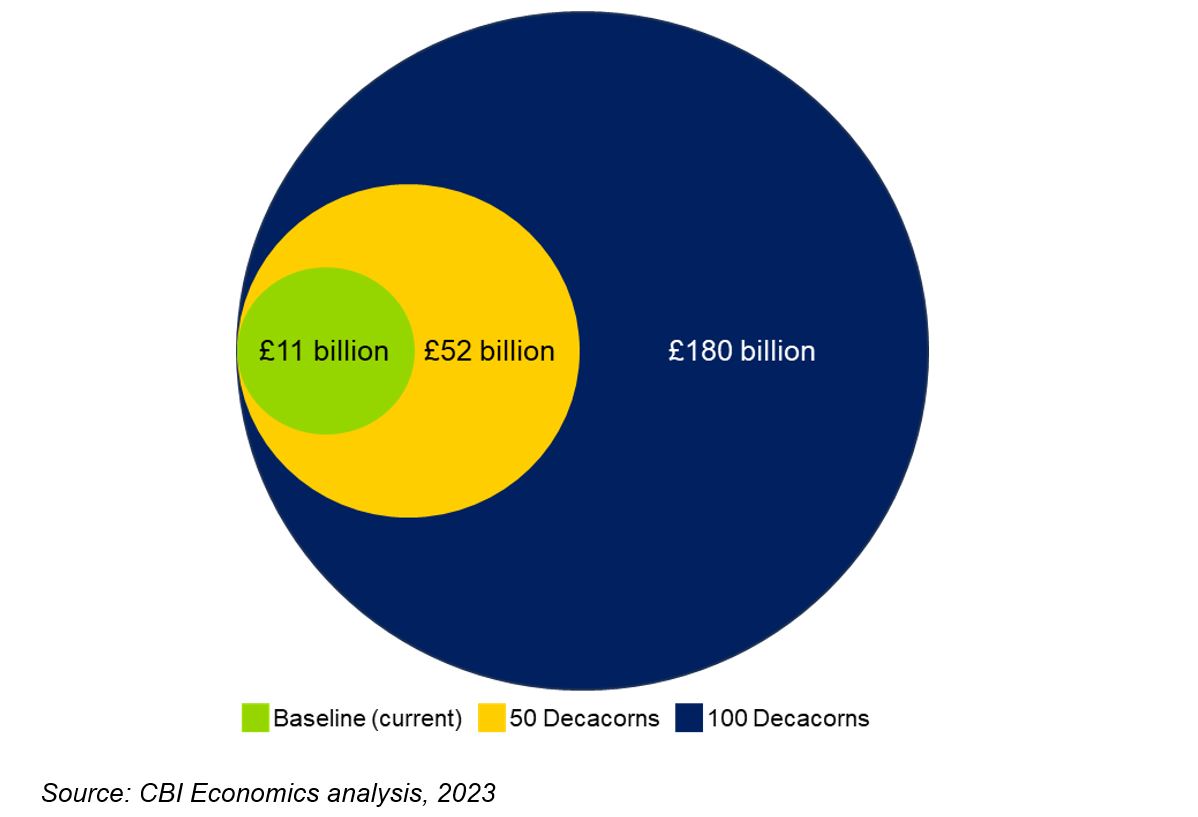CBI Economics investigates the contributions these companies make to our economy and the size of the prize from fostering further high-value growth.
Key takeaways
- UK decacorns, unicorns and soonicorns already contribute 2.6% to UK GVA and support 2.3% of UK jobs, despite only accounting for a tiny fraction of UK employers.
- Growing the number of decacorns from nine to 100 could see an extra £177bn for the UK economy.
The CBI is striving to create a supportive environment for high-growth, innovative businesses. To better understand the UK opportunities for business growth and innovation, we set out to investigate the success of the UK’s current population of decacorns (companies valued at over $10bn) – a small, yet highly productive, fast-growing and innovative subset of UK businesses.
We also wanted to understand what the UK could stand to gain from fostering similar growth in other businesses with similar potential, such as unicorns (value over $1bn) and soonicorns (value over $500m).
This CBI Economics analysis shares some insight into these companies and showcases the economic and fiscal benefits of growing the UK’s population of decacorns.
What are decacorns?
For a company to be defined as a UK decacorn we set out four criteria the company must meet.
- The company must be headquarted in the UK
- The company was founded after 1990
- The company must still be active today and have not been acquired by a third party, a standalone entity
- The company must meet certain valuation requirements, depending on whether it is a private or public company
a) Private companies must be valued at over $10bn at the latest funding round
b) Public companies must have a market cap of $10bn within the last 2 years AND a current market cap of over $5bn.
OC&C research suggests that there are currently nine decacorns, 108 unicorns and 173 soonicorns and they’re all creating opportunities in terms of jobs supported, economic value and tax revenues generated for public finances.
So, to analyse the scale of that contribution – and its potential for the UK economy – we gathered company level data on all the firms identified by OC&C and mapped these across sectors. Then, using our proprietary in-house model of the UK economy, we estimated the economic contributions of these companies. The total economic contribution is made up of three components: initial contribution, supply chain contribution and induced contribution.
Figure 1. Total economic contribution calculation

So, what do these companies currently contribute to the UK economy?
The economic activity of decacorns, unicorns and soonicorns taken together directly contributed £21.9bn in Gross Value Added (GVA) to the UK economy in 2021[1], or about 1.1% of the UK’s total output. Through their supply chain spending and the spending of employees’ earnings, they generated an additional £28.5bn in GVA. That means in total, these companies collectively contributed £50.4bn in value to the UK economy. So, while only accounting for roughly 0.001% of UK employers, their GVA amounted to 2.6% of the UK economy.
Figure 2: Total GVA (£m) by business type – initial & wider economy contributions

These companies collectively employed 226,000 FTE (full-time equivalent) jobs and supported a further 329,000 jobs throughout the wider UK economy through the channels discussed above. This adds up to over across the UK economy, or 2.3% of the UK’s total employment.
Figure 3: Total FTE jobs supported by business type

The jobs created directly by these companies were also highly productive, generating on average £97,050 in value per job for the UK economy. For comparison, this is 30% more productive than the UK average of £74,650.
Decacorn, unicorn and soonicorn activity also contributes to the UK’s public finances. Through corporate taxes on their activity and their supply chain, they contributed £3.2bn to the UK’s public finances. They contributed a further £1.6 bn through the income taxes paid by their employees, bringing the total contribution to £4.8bn in tax revenues, or 0.5% of the UK’s public finances in 2021.
Decacorns embody the definition of ‘high-growth’ firms and bring significant contributions to the UK economy
As well as looking at the combined impact of these companies, we carried out further modelling on the economic impacts of UK decacorns alone. OC&C research (April 2023) shows that despite their small number decacorns demonstrate high growth, with an estimated annual revenue growth of 20%, and they employ on average around 2,200 people each, signalling that these companies' economic contributions will be significant.
It is important to remember there are currently only nine UK decacorns: Revolut, ARM, FNZ, The Access Group, Checkout.com, Global Switch, Just Eat, Admiral and Ocado.
Our modelling shows that decacorns directly contributed £4.6bn in GVA to the UK economy in 2021 and employed 33,100 jobs. Notably, their workforce is highly productive, with each employee generating an average of £140,950 in GVA which is nearly twice as productive as the UK average).
Their contribution rises to a total of £11.2bn in GVA (0.6% of UK total) once the wider economy contributions are taken into account. Their demand for goods and services from other industries, and their employees’ spending, supported a further 73,900 jobs throughout the wider economy – more than 2 additional jobs for each decacorn employee. In total, these companies supported 107,000 jobs in the UK economy (0.4% of the UK’s total employment).
Figure 4: Total economic contribution of decacorns

Through corporate taxes, on their activity and supply chain, they contributed £860m to the UK’s public finances. They contributed a further £330m through the income taxes paid by their employees, bringing the total contribution to £1.2bn in tax revenues, or 0.1% of the UK’s public finances in 2021.
The impacts of growing the UK’s population of decacorns
Nine might be a small number, but with the right conditions, the UK’s pool of fast-growing 108 unicorns and 173 soonicorns has the potential to grow the number of decacorns in this country significantly.
To illustrate the benefits that this would bring, we modelled two hypothetical scenarios for growth in the population of UK decacorns: growth to 50, and to 100 decacorns. For this, we took the current highest valued UK unicorns and modelled their contributions if they were to grow to meet the valuation requirements of a decacorn.
Growing the UK population of decacorns from nine to 50, total GVA contributions could rise from £11.2bn to £52.0bn or 2.7% of the UK’s total current GVA. In this scenario the total number of jobs they support could rise from 107,000 to 599,000, representing 2.3% of the UK’s total employment.
By growing the UK population of decacorns to 100, total GVA contributions could increase to £178.2bn, representing 9.2% of the UK’s total GVA. The total number of jobs UK decacorns supported would increase to 1,927,000, which represents 7.3% of the UK’s total employment.
Figure 5: Total GVA (£) of different decacorn populations

Additional Benefits
In addition to the value added directly to the economy and jobs supported by these companies, decacorns add value by promoting innovation. When looking at examples of decacorns (both UK based and international) a common theme appears: the use of innovative, scalable technology. For example, Revolut offers consumers a ‘do it all’ style financial smartphone app aimed at making banking services more accessible; Sweden’s Klarna allows consumers to adopt a new way to purchase items, via a ‘buy now, pay later’ service; and Miro of teams to share and create ideas using a virtual whiteboard, providing a more productive way to conduct business. The list could go on, but the point remains the same: decacorns are born out of successful innovations that benefit both consumers and businesses.
Decacorns are also highly capable at attracting foreign direct investment (FDI) into the UK. Just over half (54%) of funding for these companies is estimated to come from the United States [3]. FDI directly support economic growth and by creating a friendly environment for decacorns levels of FDI can be expected to increase.
There is clear evidence that these companies are already having a significant impact on the UK economy. They provide highly productive jobs, support innovation, attract investment and contribute to public finances. By creating a supportive environment for decacorns, unicorns and soonicorns, the UK has an opportunity to enhance these impacts and add huge value to our economy.
Read the findings: The UK and regional economic contributions of decacorns
About CBI Economics:
At CBI Economics, we have a team of dedicated economists with wide-ranging experience in evidencing the need for policy changes and assessing their impacts. We can help you calculate the fiscal costs and benefits of your policy ideas, demonstrate their economic and social impacts, and even help you to best articulate the issues you face through economic evidence.
Get in touch today to find out more about economic consultancy from CBI Economics experts.










